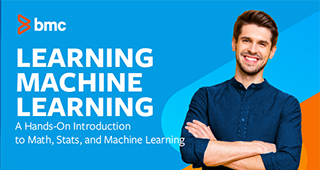In the age of digital transformation, approaches to predicative analytics and automation look different for every organization. For some, it is a push towards embracing new technologies as a way to improve operations, while for others it is a radical shift in business processes to completely change systems as they know them.
We have put together a list of some of the most popular TED Talks surrounding automation and the effects of digital transformation through technologies like AI and Machine Learning. These digital transformation TED Talks discuss ideas about new innovations in the field, their implications, advantages, and potential consequences.
(This article is part of our Tech Books & Talks Guide. Use the right-hand menu to navigate.)
1. Can we build AI without losing control over it?
Sam Harris
Have you taken the time to think about what will happen if machines ever become more intelligent than humans? Maybe you should. In this presentation, neuroscientist and philosopher Sam Harris poses this question and more, covering the benefits and risks associated with superintelligent AI. As technology only continues to be improved upon each year, this seemingly sci-fi idea could quickly become a reality, giving machines the power to further improve themselves.
2. What happens when our computers get smarter than we are?
Nick Bostrom
In a similar theme, philosopher and technologist Nick Bostrom examines how we will handle our AI once it becomes as “smart” as a human being (with some research suggesting this could even happen within the current century). As AI sees an intelligence explosion, it will be up to current engineers and technologists to figure out how to give it not only human capabilities, but our values and ideals, as well.
3. Don’t Fear Superintelligent AI
Grady Booch
Scientist and philosopher Grady Booch presents on the concept of superintelligent AI and what this could look like in years to come. Instead of fearing it, however, he recommends we view it as a way to enhance human life, teaching our machines human values and emotions when possible. By teaching them through systems and games, Booch rationalizes we will be able to one day trust machines more than people.
4. We’re Building a Dystopia Just to Make People Click on Ads
Zeynep Tufekci
In an eye-opening presentation, techno-sociologist Zeynep Tufekci details how personalization marketing goes far beyond clicking on ads. With companies like Google, Facebook, and Amazon utilizing algorithms to personalize content, these same algorithms are used to predict personal and other social information, to most people’s lack of knowledge. Tufekci offers some solutions to help control this type of technology we well as what organizations can do to begin the conversation.
5. How we’ll earn money in a future without jobs
Martin Ford
As machines continue to become more intelligent, an underlying fear for many people has been: will a machine ultimately take over my job? In a straightforward talk about this idea, futurist Martin Ford points out how this fear has gone back hundreds of years, with the concerns coming up again and again as something new is innovated. He also makes the case for a universal basic income instead of an income from traditional work.
6. 5 ways to lead in an era of constant change
Jim Hemerling
Organizational change expert Jim Hemerling believes that adapting current business processes should be invigorating and exciting instead of something to dread. In this talk, he outlines five strategic imperatives for how leaders can turn company reorganization into an empowering, energizing task for all. These imperatives all involve putting people first, and start with connecting to a deeper sense of purpose, instilling teams with the capabilities they need to be successful through change.
7. The jobs we’ll lose to machines – and the ones we won’t
Anthony Goldbloom
As Machine Learning continues to become more complex, and moves beyond simple tasks like sorting mail and assessing credit risk, workers become more concerned that their jobs will eventually be replaced by a robot. Anthony Goldbloom, co-founder and CEO of Kaggle, presents on this concept and explains why machines may be able to take over frequent, high-volume tasks but how they will never be able to compete with humans regarding jobs that involve novel situations.
8. How AI can enhance our memory, work and social lives
Tom Gruber
Not everyone is worried about the potential threats that AI and Machine Learning pose. In fact, computer scientist, inventor, and entrepreneur (and one of the creators of Siri) Tom Gruber views AI as a way to make us better, with its purpose to empower humans with machine intelligence while enhancing our current abilities. Whether through perception, creativity, or cognitive function, Gruber shares his vision for a future where AI helps us achieve superhuman performance.
9. How computers are learning to be creative
Blaise Agüera y Arcas
Blaise Agüera y Arcas is a software engineer and principal scientist at Google who works with deep neural networks for machine perception and distributed learning. In his TED Talk, he demonstrates how we are beginning to model computers more after our minds, working towards making them as a human extension rather than just a machine.
10. How AI can bring a second Industrial Revolution
Kevin Kelly
We all know how life-changing the Industrial Revolution was for society, but have we yet experienced just how massive AI can be? According to Kevin Kelly, writer and founding executive editor of Wired magazine, we haven’t even scratched the surface. In this talk, Kelly examines three trends in AI we need to understand in order to embrace it and steer its development, which in 20 years, will consist mainly of things that haven’t even been invented yet.






